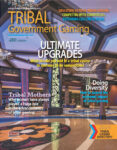
As I wrote the online gaming piece for this year’s Tribal Government Gaming, I was fascinated by the divide in Indian Country about the subject. There are passionate arguments being made on both sides of the issue, and I can understand why these positions are held so steadfastly.
There is a small parallel with commercial gaming and its long-held opposition to online gaming, a position that only began evaporating a couple of years ago. Like tribal casinos, commercial casino companies were terrified that a new form of gaming would keep players at home rather than traveling to their gaming halls. And putting their heads in the sand seemed to work for a time, but online gambling by U.S. players grew steadily. It halted quickly in 2006 upon the passage of the Unlawful Internet Gambling Enforcement Act, but the market was slowly rebuilt and today is equal if not greater than 2006.
Technology has also rocketed forward. Today, it’s not unreasonable to assume that you can identify your players, bar underage and problem gambling, and be assured that the player is where the geo-locator says he is. In fact, online gaming is better at the integrity issues because there is an electronic record of every game, move, decision and transaction.
Commercial casino companies eventually came to the conclusion it’s better to get in front of the issue rather than being left behind. So, what convinced the commercial casinos to change their stance is the beginning of a discussion to make tribal government gaming consider what course is best.
Of course, Indian gaming has other issues, some more important than player identity and geo-location. Tribal sovereignty is a concept that is inviolable in Indian Country. In some respects, online gaming seems to threaten that, should the federal government or the individual states take control of it. After all, one sovereign cannot tax another, and the sovereign that submits to taxation or other control loses a bit of its independence.
But can tribal sovereignty still be protected while submitting to taxation? There are many companies owned by tribal members and even tribal governments that operate off the reservation and are therefore subject to state regulations, oversight and taxation, with no loss of tribal sovereignty. Construction companies, retail operations or service organizations are just a few examples of businesses run by tribes subject to state oversight.
So if a tribe sets up a public online gaming company organized under state regulations and subject to state taxation, but separate from tribal government, is that a violation of sovereignty? When the Mohegan tribe won a commercial gaming license in Pennsylvania, subject to the same rules, regulations and taxation as any state casino or racino, did that threaten the tribe’s sovereignty? The answer is clearly no, so why can’t the same principle apply for online gaming?
That’s not to denigrate the concerns of many tribes about the impact of online gaming. After all, the remote locations of many tribal casinos already take an effort by the players to travel to them, so if they can gamble online in the comfort of their own home, that trip may seem even more onerous.
But if tribes do not act and a state lottery or other commercial enterprise fills the vacuum, where does that leave the tribes?
In many ways, the growth of online gaming is inevitable. Tribes can’t stop it, but they can play a role in it. The question is what role will it will be and how it can be crafted to save sovereignty and become a net gain.
Yes, the arguments on both sides are passionate and convincing, but each party must realize that online gaming offers both opportunities and challenges. To sit back and wait for the next development in online gaming is not an option. Tribes need to be proactive and ready to step up to take control of their own online-gaming destinies. There are many experts in this field who can draw that middle road between those tribes fearful of the impact of online gaming and those that want to drop everything to grab the advantages.
John Tahsuda told me that when gaming first started in Indian Country, there was little gaming experience, but tribes had nothing to lose, so mistakes didn’t have many consequences. That’s not the case today. Mistakes and missteps can have serious results, so every gaming tribe needs to study online gaming and evaluate how they can play a part in this new and exciting industry for the benefit of the tribal community. Don’t make the mistake of burying your head in the sand while the industry runs you over.














